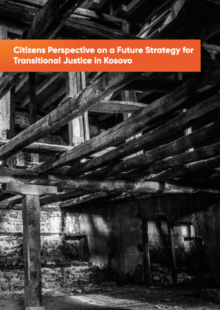Citizens Perspective on a Future Strategy for Transitional Justice in Kosovo
February 4, 2021Download 969.33 kb
Kosovo citizens of diverse ethnic backgrounds believe that it is high time for Kosovo for a national and comprehensive approach for dealing with the past, shows the report ‘Citizens Perspective on a Future Strategy for Transitional Justice in Kosovo’ by Dr. Gëzim Visoka and Besart Lumi. The report offers a summary of goals, priorities, and the most salient issues that Kosovo citizens consider crucial to be addressed.
Diverse ethnic groups have their own priorities that do not necessarily match. An inclusive National Strategy is the only pathway to ensure that the past in not avoided and that a measure of justice is served to all affected communities, the truth comes forth, and that younger generations are not held hostage of the past but move towards a more peaceful society. Only through a bottom-up, citizen-centered, and inclusive process a future strategy and institutional action is likely to enjoy wide public legitimacy. As such, the study recommends the following:
- As transitional justice has a different meaning to different ethnic communities in Kosovo, it should be designed from the bottom-up, including all affected communities.
- The future strategy should serve as a platform for many sides of truth to come forth, justice is brought to the victims in a non-selective and non-ethnic basis, and that entitlements are distributed in a just, fair, and inclusive process.
- An institutional mechanism is needed which brings together existing transitional justice initiatives and mechanisms in Kosovo.
- Design educational and outreach programs which enhance the general public’s knowledge on transitional justice.
- The EU-facilitated dialogue for normalization of relations between Serbia and Kosovo must address the pressing and outstanding issues for dealing with the past.
The report is a supplement to the study entitled Democratizing Transitional Justice in Kosovo (May 2020) which offers a detailed review of past transitional justice initiatives in Kosovo and proposes a four-step approach to developing an institutional infrastructure for dealing with the past in Kosovo.





